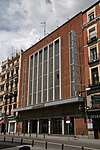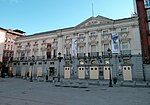Line 1 (Madrid Metro)

Line 1 of the Madrid Metro is an underground metro line running from Pinar de Chamartín in the north to Valdecarros in the southeast, via Sol. Today it has 33 stations and spans 24 km (14.9 mi) from end to end. The line was the first metro line of the Madrid Metro, and the first metro line built in all of Spain. It originally contained only 8 stops connecting Cuatro Caminos in the north to the city center at Puerta del Sol. Line 1 marks the start of the Madrid Metro with its inauguration on 17 October 1919 and public service beginning 14 days later on 31 October. There have been various extensions to the line since it opened including the most recent northern extension to Pinar de Chamartin on 11 April 2007 and a southern extension on 16 May 2007 to Valdecarros. Line 1 is the second busiest line on the Madrid Metro, behind Line 6, with more than 7.5 million monthly trips.
Excerpt from the Wikipedia article Line 1 (Madrid Metro) (License: CC BY-SA 3.0, Authors, Images).Line 1 (Madrid Metro)
Calle de Atocha, Madrid
Geographical coordinates (GPS) Address Nearby Places Show on map
Geographical coordinates (GPS)
| Latitude | Longitude |
|---|---|
| N 40.4125 ° | E -3.6994 ° |
Address
Magdalena
Calle de Atocha
28012 Madrid (Centro)
Community of Madrid, Spain
Open on Google Maps










